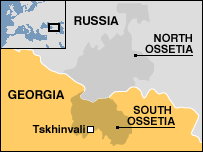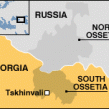
MOSCOW ENCOURAGES NORTH-SOUTH OSSETIAN IRREDENTISM AGAINST GEORGIA
Publication: Eurasia Daily Monitor Volume: 5 Issue: 97
By:

On May 20 Moscow signaled officially that it was prepared to promote annexation of Georgia’s region of South Ossetia to the Russian Federation. The Russian government seems set to underwrite an ethnic irredenta there, seeking to put an Ossetian face on Russian state expansionism (as it puts an Abkhaz face on Russian policy there).
The Ministry of Foreign Affairs organized, and Minister Sergei Lavrov attended, a presentation of North Ossetia in Moscow for foreign diplomats and businessmen, ostensibly to mark the 225th anniversary of North Ossetia’s incorporation into the Russian Empire. North Ossetian President Teymuraz Mamsurov told the audience in his speech, “I call on you to support the just desire of the Ossetian people to be united.” Mamsurov announced that he would approach foreign diplomatic missions in Moscow with requests to “assist North and South Ossetia to unite” (Itar-Tass, www.novosti.ru, May 20).
Mamsurov’s pronouncement seems not only to have been authorized, but evidently orchestrated, with Lavrov’s presence at the event indicating high-level support. Lavrov delivered remarks encouraging foreign investment in North Ossetia, presenting the territory as a regional leader in terms of development, and portraying it as a place of multi-ethnic coexistence. His stress on the purported multi-ethnicity could be read as an indirect suggestion that Georgians, who comprise one third of South Ossetia’s population, could fare well in such an environment in the event of South Ossetia merging with North Ossetia.
In reality, North Ossetia showcases Moscow’s divide-and-rule ethnic politics in the Caucasus, which has often had brutal ramifications. Assisted by Moscow’s interior troops in the early 1990s, North Ossetian authorities ethnically cleansed the Ingush from a disputed territory that Moscow had incorporated into North Ossetia. The Russian government traditionally regards North Ossetians as the most loyal ethnic group in the Caucasus, for whom it seems exceptionally prepared to underwrite border revisions and population shifts on ethnic grounds. In further contrast to Lavrov’s depiction of ethnic relations there, Ossetians on the Russian side of the border are subjected to intense linguistic Russification, whereas Ossetian native-language use and schooling has traditionally fared better on the Georgian side of the border.
Russian-installed leaders in South Ossetia hailed Mamsurov’s pronouncement. “South Ossetia’s main goal is unification with North Ossetia in the Russian Federation. We make no secret of this in front of the international community,” “President” Eduard Kokoity declared in Tskhinvali (Interfax, May 20). South Ossetia’s “envoy to the Russian Federation” (Itar-Tass, May 20), Dmitry Medoyev, similarly declared at the Moscow event, “The separation of Ossetians is an acute issue because a national organism can not fully develop when divided in two. This problem will persist until the divided Ossetian people achieve unity.”
Kokoity and Medoyev mentioned two possible ways of achieving that goal: either merging South Ossetia with North Ossetia into a single unit within the Russian Federation or forming a distinct South Ossetian constituent part of the Russian Federation alongside North Ossetia. In either scenario they suggested a possible intermediate stage in the form of an “independent” South Ossetia, recognized by Russia de facto, and a referendum leading to subsequent incorporation into Russia (Ekho Moskvy, May 20).
Speaking on the same day in the Duma, Lavrov urged South Ossetia and Abkhazia to prejudge Georgia’s peace proposals negatively: “Georgia’s actions to not confirm those proposals in practice.” Lavrov warned Georgia to “stop boycotting the existing peacekeeping and negotiating formats” and give up its attempts at internationalizing them. In South Ossetia’s case, the Georgian government withdrew in February from the Russian-dominated Joint Central Control Commission, where Moscow and the two Ossetias outvote Georgia by three to one and are ruling out international participation (Interfax, Itar-Tass, May 20).
Lavrov also offered to broker Tbilisi-Tskhinvali and Tbilisi- Sokhumi agreements on non-use of force, which in the form proposed would: 1) treat Georgia and the unrecognized secessionist authorities as equal in status; 2) implicitly recognize those authorities by quasi-treaties with them; and 3) enshrine Russia’s and its troops’ role as “guarantor” of those arrangements, thus precluding internationalization of Russian “peacekeeping.” In a media release the same day, Russia’s Foreign Affairs Ministry described Georgia’s attitude toward Russian “peacekeeping” troops as a “slanderous and primitive-hooligan” attitude (Interfax, May 20).
Moscow’s loud move on South Ossetia is largely intended to influence Georgia’s May 21 parliamentary elections. It seems designed to impress on Georgian voters that the government cannot handle relations with Russia or deliver on promises to restore Georgia’s territorial integrity, and more broadly to signal that the government is cornered on multiple fronts. Russia’s latest military moves in Abkhazia were also partly calculated to undermine the Georgian government’s standing with voters in the run-up to these parliamentary elections.
Beyond its short-term goals, the endorsement of Ossetian irredentism continues the process of absorbing Abkhazia and South Ossetia into Russia de facto. The Russian presidential decree of April 16 authorized direct official relations between Russian government bodies and the secessionist authorities of Abkhazia and South Ossetia (see EDM, April 18). That marked a step toward “legal” recognition in terms of Russian law, formalizing Russia’s de facto annexation policy. In the case of South Ossetia, that move is now being followed up with overt endorsement of ethnic irredentism as an additional instrument of Russian policy in the South Caucasus.




